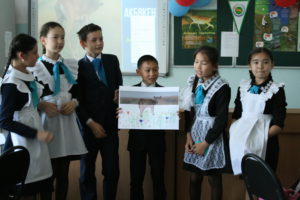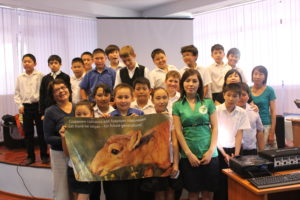The SCA recognises that it is imperative to support the next generation of conservationists, and so with our Young Conservation Leaders award we aim to support aspiring conservationists (individuals or groups) with grants which allow them to carry out grass-roots conservation projects, and receive mentoring from SCA in-country partners.
The 2016 awards are generously supported by Wildlife Conservation Network and we are pleased to be able to announce the winners.
In Kazakhstan four children between the ages of 12-14 from the Steppe Wildlife club ‘Akboken’, led by their teacher, Utalina Batima Bermuhambetovna, will be carrying out an inspirational programme of events for the children in their school, and the local region.
‘Akboken’  is a very active club whose members carry out research, speak at district and regional conferences, and hold environmental awareness events such as Saiga Day in May each year.
is a very active club whose members carry out research, speak at district and regional conferences, and hold environmental awareness events such as Saiga Day in May each year.
The team will create a circle of ‘Saiga Friends’, which aims to involve pupils from the fifth to eleventh grades in environmental activities and to start an environmental ‘chain reaction’. Akboken will give these Saiga Friends talks on saiga conservation and raise the awareness of their fellow pupils through exhibitions and posters, newspapers and cartoons etc. It will also arrange field trips and environmental activities to include the new group in spreading the news. They will also be facilitating members of the biology department at their local university to get involved in their work. Finally, no group would be complete without a logo, and they plan to launch a school-wide competition to design a logo for the new Saiga Friends group.
Aitbaeva Aigul’ Maratovna is a 27 year old English teacher from Kalmykia, Russian Federation, who originally worked at the Center for Wild Animals of the Republic of Kalmykia, a wonderful saiga breeding and research centre. Here she carried out saiga awareness campaigns for local schools and communities and helped arrange Saiga Day celebrations, she continues to help run the “Living Heritage” Steppe Wildlife club, supported by the SCA, at a local school.

In 2014 she was awarded our Young Conservation Leader award and designed, wrote and produced the colourful booklet the “Amazing nomad” aimed at children in grades five to seven. This year she plans to launch the ‘Rescue a Saiga’ competition in three villages within the saiga’s range. Aigul’ will be looking for the best leaflet designed by children, which tackles the illegal advertising and sales of saiga-based products in rural villages. The winning designs will be printed and distributed in five other local villages.
Aigul’ plans to work with local Steppe Wildlife clubs who will visit each of these five villages with her, putting on shows and talks and handing out copies of her ‘Amazing Nomad’ booklet to raise awareness of saiga conservation.
In Mongolia, Munkhnast Dalannast, a young scientist who works for WWK-Mongolia has been awarded a grant to carry out some essential scientific work.
Mongolian saiga inhabit a semi-desert area in western Mongolia. They are well adapted to hot and dry conditions, and can go without water for short periods of time. However, safe sources of drinking water are very limited during the dry season and we don’t yet understand the water requirements of these animals. Furthermore, the degree of dependence of a herbivore on drinking water can have an important impact on the food resources in its habitat, and many conservationists believe that effective management of water resources could be an important factor in the successful conservation of saigas in this and other, areas.
With this in mind Munkhast will carry critical scientific research into the water requirements of the saiga antelope, he then will identify and map key saiga watering holes within the region. This new research will allow NGOs and authorities to work together to produce a management plan in order to maintain these existing sites, as well as devising a plan to safeguard this critical aspect of maintaining the health and wellbeing of the saiga population and its environment.
